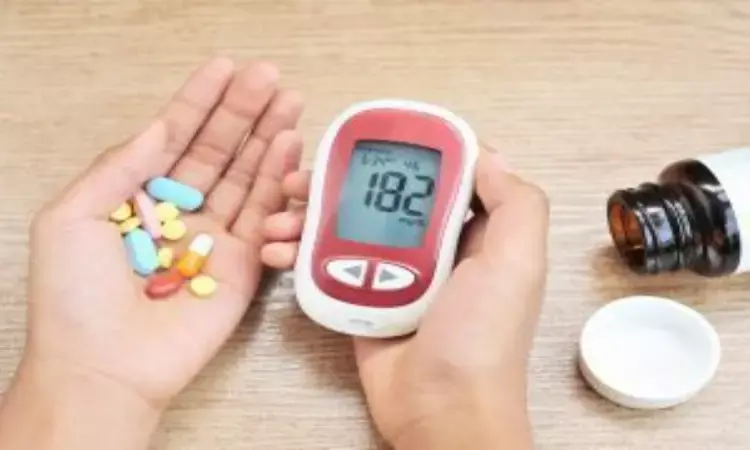- Home
- Medical news & Guidelines
- Anesthesiology
- Cardiology and CTVS
- Critical Care
- Dentistry
- Dermatology
- Diabetes and Endocrinology
- ENT
- Gastroenterology
- Medicine
- Nephrology
- Neurology
- Obstretics-Gynaecology
- Oncology
- Ophthalmology
- Orthopaedics
- Pediatrics-Neonatology
- Psychiatry
- Pulmonology
- Radiology
- Surgery
- Urology
- Laboratory Medicine
- Diet
- Nursing
- Paramedical
- Physiotherapy
- Health news
- Fact Check
- Bone Health Fact Check
- Brain Health Fact Check
- Cancer Related Fact Check
- Child Care Fact Check
- Dental and oral health fact check
- Diabetes and metabolic health fact check
- Diet and Nutrition Fact Check
- Eye and ENT Care Fact Check
- Fitness fact check
- Gut health fact check
- Heart health fact check
- Kidney health fact check
- Medical education fact check
- Men's health fact check
- Respiratory fact check
- Skin and hair care fact check
- Vaccine and Immunization fact check
- Women's health fact check
- AYUSH
- State News
- Andaman and Nicobar Islands
- Andhra Pradesh
- Arunachal Pradesh
- Assam
- Bihar
- Chandigarh
- Chattisgarh
- Dadra and Nagar Haveli
- Daman and Diu
- Delhi
- Goa
- Gujarat
- Haryana
- Himachal Pradesh
- Jammu & Kashmir
- Jharkhand
- Karnataka
- Kerala
- Ladakh
- Lakshadweep
- Madhya Pradesh
- Maharashtra
- Manipur
- Meghalaya
- Mizoram
- Nagaland
- Odisha
- Puducherry
- Punjab
- Rajasthan
- Sikkim
- Tamil Nadu
- Telangana
- Tripura
- Uttar Pradesh
- Uttrakhand
- West Bengal
- Medical Education
- Industry
Cotadutide significantly reduces blood sugar and weight in diabetics with CKD: Study

UK: A recent study in the journal Diabetes, Obesity and Metabolism has found that cotadutide is an effective treatment option in patients with type 2 diabetes (T2D) and chronic kidney disease (CKD). The treatment was shown to significantly improve postprandial blood sugar control and reduce bodyweight versus placebo.
"Reductions in urinary albumin-to-creatinine ratios suggest potential benefits of cotadutide on kidney function. further evaluation in larger, longer-term clinical trials may be warranted," Victoria E. R. Parker, AstraZeneca, Cambridge, UK, and colleagues wrote in their study.
Cotadutide (MEDI0382) is a balanced GLP-1 and glucagon receptor dual agonist, with an approx ratio of 5:1 GLP-1 to glucagon activity. Dr. Parker and colleagues conducted the study with an objective to assess the safety, efficacy and tolerability of cotadutide in patients with type 2 diabetes mellitus and chronic kidney disease in a phase 2a study.
The study included patients with body mass index 25-45 kg/m2, estimated glomerular filtration rate 30-59 ml/min/1.73 m2 and type 2 diabetes [glycated haemoglobin 6.5-10.5% (48-91 mmol/mol)] controlled with insulin and/or oral therapy combination. They were randomized in the ratio of 1:1 to once-daily subcutaneous cotadutide (50-300 μg) or placebo for 32 days. Plasma glucose concentration assessed using a mixed-meal tolerance test was the primary endpoint.
Salient findings of the study include:
- Participants receiving cotadutide (n = 21) had significant reductions in the mixed-meal tolerance test area under the glucose concentration-time curve (–26.71% vs. +3.68%), more time in target glucose range on continuous glucose monitoring (+14.79% vs. –21.23%) and significant reductions in absolute bodyweight (–3.41 kg vs. –0.13 kg) versus placebo (n = 20).
- In patients with baseline micro- or macroalbuminuria (n = 18), urinary albumin-to-creatinine ratios decreased by 51% at day 32 with cotadutide versus placebo.
- No statistically significant difference was observed in mean change in estimated glomerular filtration rate between treatments.
- Mild/moderate adverse events occurred in 71.4% of participants receiving cotadutide and 35.0% receiving placebo.
Cotadutide improved glycaemic control and weight loss in patients with type 2 diabetes and CKD, and also shows the potential to reduce albuminuria.
"Based on the growing evidence of the shared pathogenetic mechanisms underlying type 2 diabetes, NAFLD/non-alcoholic steatohepatitis and CKD, and the improved glycaemic control, enhanced insulin sensitivity, reduction in bodyweight and improved lipid and hepatic biomarkers in obese patients with type 2 diabetes, cotadutide may be a potentially beneficial therapy in patients with CKD and type 2 diabetes," wrote the authors.
Reference:
The study titled, "Efficacy and safety of cotadutide, a dual glucagon-like peptide-1 and glucagon receptor agonist, in a randomized phase 2a study of patients with type 2 diabetes and chronic kidney disease," was published in the journal Diabetes, Obesity and Metabolism.
Dr Kamal Kant Kohli-MBBS, DTCD- a chest specialist with more than 30 years of practice and a flair for writing clinical articles, Dr Kamal Kant Kohli joined Medical Dialogues as a Chief Editor of Medical News. Besides writing articles, as an editor, he proofreads and verifies all the medical content published on Medical Dialogues including those coming from journals, studies,medical conferences,guidelines etc. Email: drkohli@medicaldialogues.in. Contact no. 011-43720751


